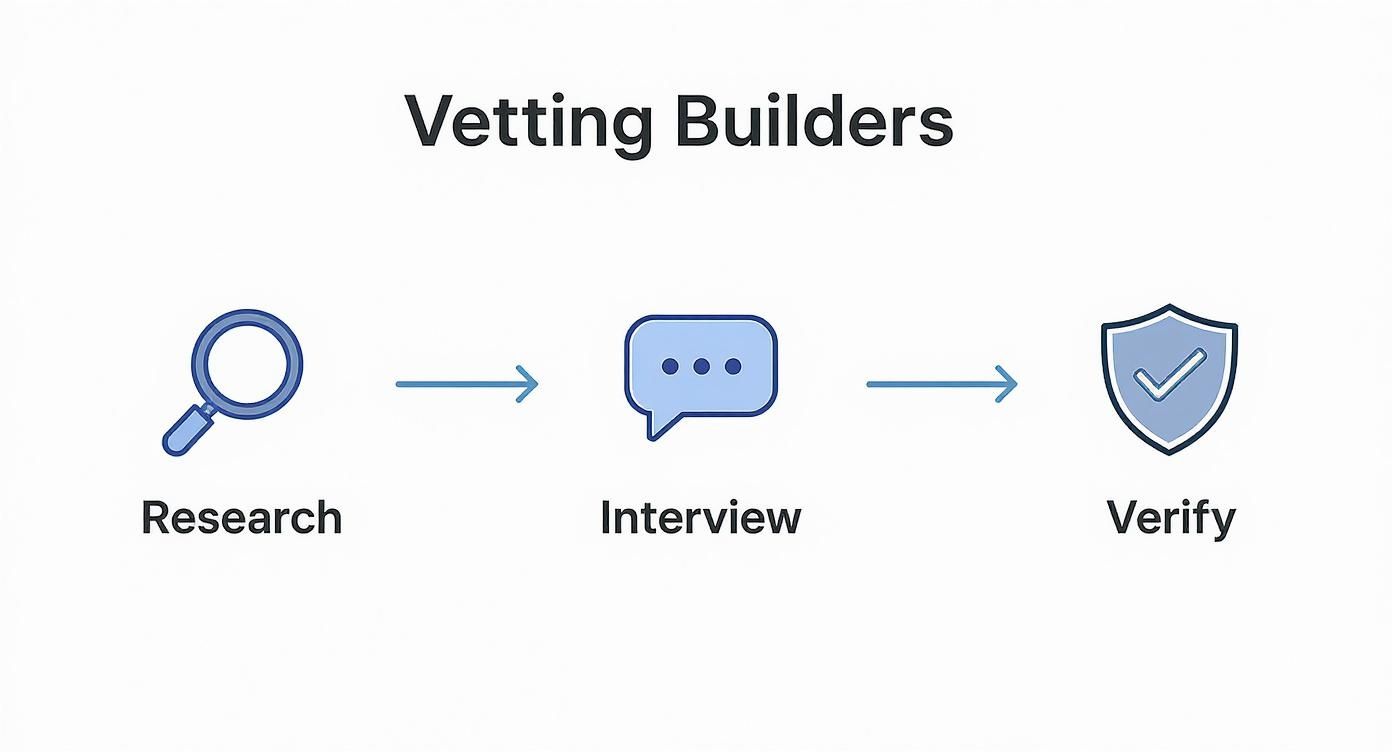Finding Trusted Builders in Southampton
- Dan Hall
- Nov 13, 2025
- 13 min read
Finding the right builders in Southampton is the single most critical decision you'll make for any home renovation. It's the one choice that dictates the quality of the finish, whether you stick to your budget, and frankly, your stress levels for the next few months. This guide isn't just about a quick Google search; it’s a practical framework our in-house service's use to help clients find, vet, and ultimately hire a team they can actually trust.
How to Find and Vet Your Ideal Builder in Southampton
The journey to finding a reliable builder starts long before you're looking at quotes. It begins with smart research and knowing where to find genuine recommendations. While online searches are a starting point, the best professionals are often found through trusted platforms and good old-fashioned word-of-mouth, especially in tight-knit communities like Poole and Christchurch where a builder's reputation is everything.
You can get a solid baseline from online directories like Checkatrade or the Federation of Master Builders. They offer a filtered list of contractors who’ve been vetted to some degree, showcasing reviews, qualifications, and past projects. But don't stop there. Local Facebook groups for Southampton, Ringwood, or Bournemouth can be goldmines for honest, unfiltered feedback from homeowners who've been in your shoes.
Create Your Shortlist
Once you’ve gathered a few promising names, the real detective work begins. Your goal is to whittle that long list down to a shortlist of three or four top-tier candidates. This is about more than just browsing their website gallery; it demands direct contact and some careful checks.
Make First Contact: Send a brief email outlining your project. How do they respond? Are they prompt, professional, and clear? This first interaction tells you a lot about their communication style.
Ask for References: Any builder worth their salt will happily provide contact details for two or three recent clients with projects similar to yours. If they hesitate, that's a red flag.
Verify Their Insurance: This is non-negotiable. Ask to see current copies of their Public Liability and Employers' Liability insurance certificates. Make sure the coverage is adequate for the scale of your project.
The infographic below breaks down this simple, three-stage process for vetting builders in Southampton.

Following this flow—research, interview, verify—ensures you’ve covered all the essential bases before you even think about signing a contract.
Digging Deeper with Due Diligence
With your shortlist ready, it’s time to go a bit deeper. This is where you separate the good from the great. A stable, reputable firm often has a long history and solid financial standing. In Southampton, for example, some firms have been part of the city's fabric for decades, a testament to the consistent demand for skilled teams on both large and small projects. For a deeper dive, you can even explore public records for details on a company's financial health, like those available for Southampton Builders Limited.
Key Takeaway: Never, ever skip checking references. Don't just ask if they were "happy" – get specific. Did the builder stick to the budget? Was the project completed on time? How did they handle the inevitable unexpected problem? This direct feedback is the most valuable insight you can possibly get.
By taking a structured approach to your search, you can confidently find top-tier builders in Southampton. For more tips on this crucial first step, have a look at our detailed guide on how to find a renovation company near me. Of course, our in-house service's are always here to help you review potential candidates and make sure your project gets off to the best possible start.
Decoding Builder Quotes to Avoid Hidden Costs

You’ve done the hard work of shortlisting your favourite builders in Southampton. Now comes the make-or-break moment: comparing their quotes. This isn’t about spotting the lowest number and signing on the dotted line. A suspiciously cheap bid is often a warning sign that key details—and costs—have been left out.
A professional quote isn't a single figure scribbled on a piece of paper. It’s a detailed, transparent document that clearly outlines the entire scope of work. And never, ever accept just a verbal estimate. Insisting on a written, itemised quote protects you and the builder, making sure everyone’s on the same page from day one. Vague lines like "kitchen fitting" or "plastering" just aren't good enough.
What a Solid Quote Looks Like
A proper quote gives you a complete breakdown of costs, allowing you to compare different proposals fairly, even if they’re laid out differently. It should always contain these key components:
Materials: A full list of everything from bricks and timber to the specific taps and tiles you've chosen, with costs for each.
Labour: A clear breakdown of labour costs, whether it's a day rate or a fixed price for the job.
Waste Removal: The cost of hiring a skip and responsibly getting rid of all the construction waste.
Contingency Sum: A sensible allowance for the unexpected, typically 10-15% of the total project cost.
VAT: A clear statement on whether Value Added Tax is included in the final price.
If a quote is missing these details, it’s incomplete. Any reputable builder working in areas like Highcliffe or Bournemouth will provide this information without you even having to ask.
For a complete overview of what your project might cost, our guide on UK house renovation costs provides an excellent starting point for budgeting.
Comparing Quotes Like a Pro
Once you have at least three detailed quotes, it's time to sit down and compare them side-by-side. Remember, the cheapest option is rarely the best value. One builder might seem more expensive on paper, but they may have included higher-quality materials or a more thorough clean-up process, which will save you money and headaches down the road.
To help you get granular, here’s a simple checklist to see how the quotes stack up against each other.
Comparing Builder Quotes: A Quick Checklist
Checklist Item | Builder A | Builder B | Builder C |
|---|---|---|---|
Detailed Labour Breakdown? | |||
Itemised Material Costs? | |||
Scaffolding Included? | |||
Skip Hire & Waste Disposal? | |||
Contingency Sum Included? | |||
Is VAT Clearly Stated? | |||
Payment Schedule Provided? | |||
Start & Completion Dates? |
This table helps you spot discrepancies quickly. For example, does one builder's quote for your Christchurch extension include scaffolding while another's doesn't? These are the "hidden" costs that can suddenly inflate a cheap-looking price. It’s all about making sure you’re comparing apples with apples.
Getting to Grips with Planning Permission and Building Regs

Before you get lost in paint swatches and kitchen catalogues, there's some crucial groundwork to cover. It’s easy to mix up Planning Permission and Building Regulations, but they are two very different hurdles you might need to clear. Getting this wrong at the start can lead to some serious headaches and expensive delays down the line.
So, what's the difference? Planning Permission is all about the principle of what you’re building—how it looks, its size, and how it impacts your neighbours and the local area. Building Regulations, on the other hand, deal with the nitty-gritty technical stuff. They ensure the work is structurally sound, safe, and meets standards for things like fire safety, energy efficiency, and accessibility. A good builder will be able to tell you exactly what your project needs.
Do You Actually Need Approval?
Here’s the good news: for many common projects around Southampton, you might not need to go through the full planning permission process. Lots of extensions and loft conversions can fall under what’s known as Permitted Development Rights.
But hold on—this isn’t a free-for-all. These rights come with very strict rules on size, height, and positioning. This is where a local builder's experience becomes invaluable. They know how councils in Southampton, Christchurch, and Poole interpret these rules and can quickly tell you if your dream extension fits within the guidelines or if you'll need to submit a formal application.
Key Takeaway: Never, ever assume your project is covered by Permitted Development. One wrong move could result in the council ordering you to tear down your brand-new extension. Always get it confirmed first.
Special Considerations for Southampton Properties
Building in this part of the country comes with its own unique set of challenges. If you have a coastal home in places like Bournemouth or Highcliffe, for instance, your builder will need to use specific materials and techniques to stand up to the salty air and stronger winds—something that often factors into building regulations approval.
Southampton itself is also steeped in architectural history. The city is home to 317 listed buildings, each requiring specialist care and strict adherence to conservation rules for any kind of alteration. If your home is on this list, hiring builders in Southampton with proven experience in heritage projects isn't just a good idea; it's essential.
Beyond the big approvals for structure and appearance, there are countless smaller regulations to consider. These cover everything from the structural integrity of a new extension to specific details like the UK door handle height regulations. Our in-house service's are well-versed in these complexities, ensuring your plans are fully compliant from day one. For a deeper dive into the specifics, take a look at our detailed guide on UK building regulations for extensions explained.
Managing Your Project with a Solid Contract
You’ve vetted the builders, compared the quotes, and shaken hands on a price. Great stuff. But now comes the part that keeps everything on track: project management, and at its heart is a solid, detailed contract.
Don't think of it as a formality. A good contract is the official rulebook for the entire build, protecting both you and your builder from the headaches that come with crossed wires and "he said, she said" disputes. A verbal agreement is simply not enough for any project with a significant budget, whether you’re in central Southampton or out in Ringwood.
This written, signed document turns all those conversations and quotes into a binding agreement. It’s your single source of truth when questions pop up down the line.
Key Components of a Strong Contract
The enemy of a smooth building project is ambiguity. Your contract needs to be crystal clear, leaving no room for interpretation. The more detail you include now, the fewer problems you'll have later.
Make sure your agreement nails down these points:
A Full Scope of Work: This isn't just a brief overview. It’s an exhaustive list of every single task, from the first day of demolition right through to the final coat of paint. It should directly reference the architect’s drawings and the itemised quote you both agreed on.
Total Fixed Cost: The contract must state the final price, including VAT. Just as important, it needs to lay out the exact process for pricing and approving any extra work or changes (these are often called 'variations').
Projected Timeline: While building projects can hit snags, a professional timeline is essential. It should include a clear start date, key milestones (like the roof going on), and an estimated completion date. This gives everyone a target to work towards.
Payment Schedule: This is crucial. The total cost should be broken down into staged payments, and these payments should be tied to the successful completion of specific milestones. This way, you're only paying for work that has been finished to a standard you're happy with.
A typical payment structure might be a small deposit (never more than 10-15%) to get things started. After that, you'd have stage payments when the foundations are complete, when the structure is watertight, after the first-fix electrics and plumbing, and so on. The final payment should only be made when the project is 100% finished and signed off.
Protecting Your Interests
Your contract should also cover the day-to-day practicalities. Things like site access, agreed working hours, and who is responsible for waste disposal all need to be in writing. For specialised work, such as hiring expert stone wall repointing services, ensuring the specific methods and materials are documented is just as vital.
Crucially, include a dispute resolution clause. This outlines the steps you'll both take if a disagreement happens, providing a formal path to resolve issues fairly without immediately heading down the costly legal route. If you want a more detailed look at project prep, our renovating a house checklist with 10 essential steps is a brilliant resource to have on hand.
Remember this: any professional, reputable builder will want a proper contract in place. If the builder you’re talking to seems hesitant or tries to brush it off, take that as a massive red flag.
For complete peace of mind, our in-house service's can help by providing robust contract templates or reviewing any agreement your builder puts forward, making sure your investment is properly protected from day one.
Building a Strong Partnership with Your Construction Team

The contract is signed and the start date is in the diary. Great. But now, the success of your project shifts from paperwork to people. Forging a strong, positive partnership with your chosen builders in Southampton is the secret ingredient to a low-stress and successful build.
This isn’t just about being friendly; it’s about establishing clear, respectful communication from day one. A great project outcome is built on mutual understanding and a shared goal. Honestly, the best builders appreciate an engaged client who knows what they want and communicates it clearly.
Think of it as a two-way street. You expect professionalism from your crew, and in turn, it helps to be a considerate and prepared client. This foundation of respect is what helps you navigate the inevitable little bumps in the road that any major project can encounter.
Setting the Stage for Clear Communication
Don't wait for a problem to pop up before you start talking. The best way to keep things running smoothly is to set up a communication routine right from the get-go. This makes sure everyone is on the same page about progress and any decisions that need to be made.
Agree on a regular check-in schedule. It could be a brief chat on-site at the end of each week or a quick phone call. This is your time to ask questions, see the progress for yourself, and flag any minor queries before they snowball. A good builder will welcome this.
From my experience, a simple weekly walk-through with your site foreman can prevent 90% of potential misunderstandings. It’s a small time investment that pays huge dividends in keeping the project aligned with your vision.
Navigating On-Site Practicalities
Beyond the scheduled check-ins, it's the day-to-day stuff that really contributes to a positive working environment. Being a good neighbour is a big one, especially in residential areas like Highcliffe or Ringwood, where construction noise and extra vehicles can be disruptive.
A few simple courtesies can make a world of difference:
Respect Working Hours: Confirm the team's typical start and end times. This way, you know when to expect noise and when the site will be quiet.
Manage Access: Make sure the crew has clear, safe access to the site, water, and electricity without needing to constantly knock on your door.
Keep Neighbours Informed: A quick note to your neighbours about the project start date and expected duration is a considerate gesture that can prevent a lot of friction down the line.
The history of Southampton shows just how much builders have shaped the city. Back in the 19th century, firms like the Bull family were instrumental in building local housing and infrastructure, responding to the community's needs. You can read more about the historical role of Southampton's builders to get a sense of this deep-rooted connection.
This collaborative spirit is something we still see today. When you use our in-house service's, we help foster this strong partnership, making sure the lines of communication between you and your builders are always clear and productive.
Common Questions About Hiring Local Builders
Embarking on a building project for the first time can feel like learning a whole new language. There are terms to learn, costs to figure out, and plenty of pitfalls to avoid. To help you feel more confident, we’ve put together some of the most common questions we hear from homeowners looking for builders in Southampton and the surrounding areas.
What Is a Realistic Cost for an Extension in Southampton?
This is the big one, isn't it? The final price tag for an extension can swing wildly depending on its size, the complexity of the design, and the quality of the fixtures and finishes you go for.
As a general rule of thumb, you should probably budget somewhere between £1,500 to £2,500 per square metre in the Southampton or Bournemouth area.
What does that look like in real terms? A fairly basic, single-storey extension might start around the £30,000 mark. On the other hand, a larger or more intricate project—perhaps with lots of bespoke glazing or high-end kitchen fittings—could easily sail past £60,000.
This is exactly why getting several detailed, itemised quotes is non-negotiable. Our in-house service's can help you properly compare them apples-to-apples, ensuring you're getting a fair and complete price. For a deeper dive, take a look at our full renovation estimate guide to get a better feel for the numbers.
What is the Difference Between an Estimate and a Quote?
Getting this wrong can have a massive impact on your budget, so it’s vital to understand the difference before you agree to any work. They are not the same thing.
An Estimate: Think of this as a ballpark figure or an educated guess. It’s a rough idea of the cost, but it is not legally binding. The final price can—and often does—change as the project unfolds.
A Quote: This is a fixed price for a very specific scope of work that you’ve both agreed on. Once you accept a written quote, the builder can’t just charge you more unless you both agree to changes (which should always be documented in writing!).
Always, always insist on a formal, written quote rather than settling for a verbal estimate. Any professional, reputable builder will provide one without hesitation. It protects both you and them from any nasty surprises down the line.
Are There Special Rules for Building on Coastal Properties?
Yes, absolutely. Building on a property in a coastal spot like Highcliffe or Christchurch isn't the same as building inland. It demands specialist knowledge and the right materials. The salty sea air is incredibly corrosive, so everything used has to be tough enough to withstand it.
This means using things like marine-grade stainless steel for external fixtures and making sure all timber is properly treated to prevent rot and decay. Planning regulations can also be much stricter in these areas to protect the unique local environment.
It is crucial to hire builders with proven, verifiable experience on coastal projects. They’ll understand these unique challenges and know which materials will last, saving you a fortune in future repairs.
How Should I Handle a Disagreement with My Builder?
Let's be honest, the best way to handle a disagreement is to prevent it from ever happening. A solid contract and clear, regular communication are your best defence.
However, problems can still pop up. If one does, the first step should always be a calm, direct conversation with your builder. Have your written agreement to hand so you can refer to specific points.
If talking it through doesn't get you anywhere, put your concerns in writing. A clear, polite email creates a paper trail. Your contract should also have a clause that outlines a formal dispute resolution process. This is why having that robust contract from day one provides such crucial protection.
At Hallmoore Developments, we offer a full suite of in-house service's to manage every single aspect of your project. From the initial designs and quote analysis to contract management and the final handover, we've got you covered. Our Gas Safe-registered team is ready to bring your vision to life with the professionalism and care it deserves. https://www.hallmoore.co.uk
.png)
Comments